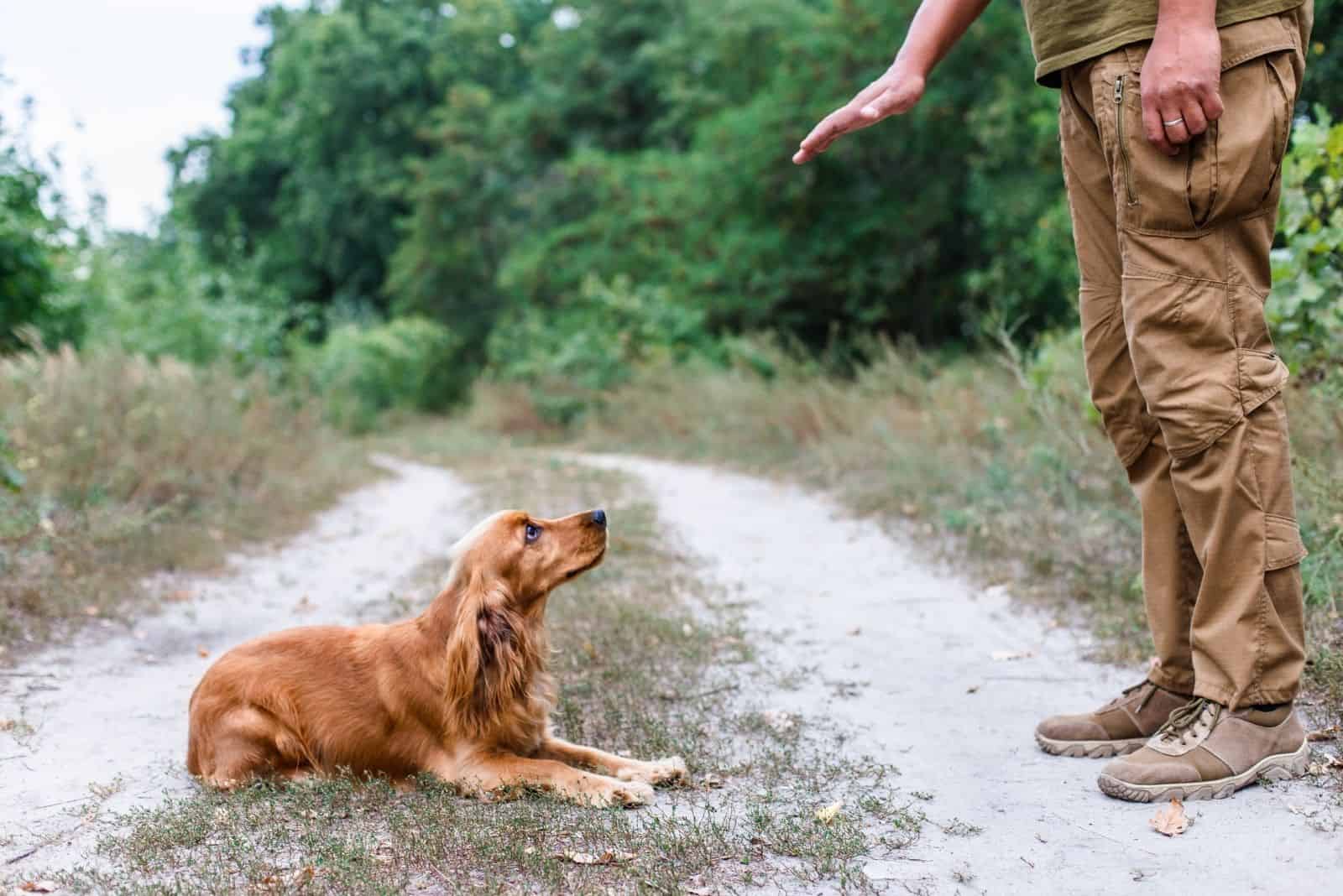Newsflash: All dogs bark!*
If this came as a surprise, you really must not know dogs very well. However, our question here is, do Cocker Spaniels bark a lot? So, what’s the deal with the Cocker Spaniel?
All the evidence suggests that Cocker Spaniel dogs can be excessive barkers.
We’re going to explore this problem in full by diving into the world of the Cocker Spaniel breed. Perhaps you have one of your own and need some advice, or maybe you’re thinking about getting a Cocker Spaniel?
Either way, you’ll want to know if this is a real problem, and if so, what you can do about it!
As there are two types of Cocker (the American and English), we’ve dealt with them separately. There’s also a section on the ‘sporting dog’ as these tend to come from different bloodlines.
*With the possible exception of the unique and wonderful Basenji. Also, Huskies howl more than they bark, but aside from this, we’ll stick with our original statement.
Do English Cocker Spaniels Bark A Lot?

Although many English Cockers are pretty quiet dogs, some can be very vocal at times.
Before we continue with our study, you might be wondering why there are two separate Cockers, so here’s a quick explanation.
For a few hundred years, there was only one type of Cocker Spaniel. This all changed in 1946 when the American Kennel Club (AKC) decided to list the English Cocker Spaniel as a separate dog breed.
It seems that selective breeding in the US had changed the Cocker’s shape and character over the years enough for the AKC to make its decision. Kennel clubs are all about preserving breeds as they are.
So, the English Cocker was to be protected and maintained by setting the American version aside as its own breed. Breeders were encouraged to avoid mixing the two, thus “polluting” both breeds.
The trouble is, the English and the American dogs are referred to as the Cocker Spaniel in their respective countries, which leads to confusion. There’s also the fact that they look much alike unless you know exactly what to look for.
Right, now we’ve cleared that up, let’s look at why the English Cocker might bark so much!
Hunting Dogs
The Spaniel was initially bred as a hunting companion like many other breeds. They were used for flushing out game from the undergrowth, driving game toward hunters, or retrieving fallen birds from the water or dense bushes and woodland.
This hunting instinct is strong and could contribute to the English Cocker’s tendency to bark.
As a gundog, they would have to make themselves heard above the sound of gunfire. They would also be caught up in all the excitement, anticipating the reward that would come when they performed well.
Although most Spaniels are family pets these days rather than retrieving the unfortunate victims of country sports, they still retain these excitable and vocal qualities.
Protective Instincts

Like so many other breeds, the Cocker Spaniel forms a strong bond with its family. They are loyal and loving and can be very protective.
Because of this, territorial barking could be a problem. You might find that your furry friend barks at other dogs or strangers when on the leash. It’s not an aggressive act; they are being protective and territorial.
Many Spaniel owners attest that their beloved pooch barks at anything. Literally anything.
Whether it’s a sudden noise, an unfamiliar sound, a passing car, a passing dog, a falling leaf, or a bird flying overhead, some Cockers will erupt into a flurry of furious barking.
Possibly worst of all is when someone dares to knock at your door or ring the bell. The average Spaniel can go from sleeping soundly to a raging ball of angry noise in about two seconds flat.
Whatever the reason, it seems that Cocker Spaniels have a passionate hatred of delivery people.
To return to our central theme, do Cocker Spaniels bark a lot? We have to say yes, especially when it comes to delivery personnel!
This is your dog’s protective instinct going into overdrive. The trouble is, it’s a self-rewarding behavior. Someone calls at the door, your dog barks like a demon, the caller goes away.
See? It worked! The dog feels a sense of triumph, having successfully scared off the evil delivery person. So, next time the doorbell rings, your dog will repeat this action.
Does this make them good watchdogs? Possibly, as they’ll raise the alarm. But as they raise the alarm about everything, it might become tedious as 99% of the time, there won’t be any real danger.
As for being a guard dog, Spaniels love people too much. Once they’re finished barking at a stranger, they’ll usually be happy to welcome them as a friend within minutes.
However, each dog is different. There is a chance that if they managed to get hold of the delivery person, they’d take a chunk out of their leg! So, it’s always best to be on the safe side.
Attention Seeking

Another reason for excessive barking is that your furry pal wants your attention.
There might be several reasons for this.
First, your puppy loves your company and wants some love. Spaniels are very friendly and affectionate and will often come for cuddles. There’s nothing they like more than snuggling with their owners. They might bark if you ignore them.
Separation anxiety is another issue connected with their love for you. Cocker Spaniels should never be left alone for more than a few hours. When left alone, they’ll pine for you. They’ll bark, howl, chew stuff, and wreck your home.
Your dog may also be asking to go out, either because it needs a bathroom break or it wants to go for a walk. Your pooch may also be asking for a treat or its dinner.
One other question to bear in mind is whether your dog has enough exercise. The Cocker Spaniel is an energetic dog that loves to romp and play.
They need plenty of physical activity and mental stimulation, or they quickly become bored. When this happens, be prepared for plenty of barking!
Barking is a dog’s way of talking to you. And that’s fine, but it can be a problem when it becomes excessive! As annoying as it can be, take time to find out what the issue is and then take appropriate action.
Health Problems
The Spaniel’s long furry ears sometimes get a build-up of gunk and dirt, allowing bacteria to breed.
Ear infections can occur because of this, making your dog shake its head and paw at its ears. They may also bark out of frustration and tell you they’re not okay.
Hip dysplasia is another common health condition affecting dogs of all breeds. This causes them a lot of pain, and your dog might whine and bark as a result.
Aside from these two, many health issues will cause your dog pain, discomfort, or confusion. One of the most distressing is dementia, usually found in older dogs.
Dogs with dementia suffer from ‘cognitive decline,’ meaning that once-familiar things will become alien to them.
They’ll stand facing the wall or stare into space for ages. They become disoriented, confused, and easily frustrated. They may also start barking for no reason.
The best way to overcome these problems is by grooming your dog regularly and booking them in for regular checks at the vet. A grooming regime should include checking your dog’s ears and keeping them clean.
If your pooch is healthy and happy, it’s less likely to bark excessively! And if barking does become a problem, you can rule out health problems as a reason.
Do American Cocker Spaniels Bark A Lot?

We’ve looked at the English version in our study, do Cocker Spaniels bark a lot?
Now it’s time to ask the same of its American cousin!
It probably won’t come as a surprise to learn that they may bark just as much as the English Cocker.
American Cockers differ from English ones in several ways. To begin with, they’re slightly smaller and have a domed skull, and their muzzle is shorter, with eyes set wider and more forward on the head than the English dog.
The English Cocker has a medium-long coat, but the American type beats this with a long, flowing coat with feathering on its legs.
These two breeds also differ in terms of temperament.
English Cockers have a higher prey drive, so they may chase after small animals and family pets. American Cockers are more affectionate and were bred specifically as companions, making separation anxiety a genuine possibility for them.
You may return home after leaving them for a few hours to find your place has been trashed. It’s not done out of spite; your dog is scared and confused because you’re not there, so they act out of character.
They’ll know they’ve done wrong, possibly by your expression. That’s when your puppy may add to the problem by peeing on the floor. Submissive urination is a fact of life with Cocker Spaniels, and it happens when they are excited or feel they need to show submission to the pack leader.
In other respects, the American dog is much the same as the English one, meaning that excessive barking may be in their nature.
Do Working Cocker Spaniels Bark A Lot?

This is a difficult one to answer! Initially, it’s tempting to say yes, they do bark more than dogs kept purely as companions. As we mentioned earlier, gundogs tended to be naturally vocal. As pack animals, most dogs love all the clamor and noise, the fun and excitement.
However, working dogs are often trained to a higher degree. On balance, this means that they are possibly less likely to be as vocal as those kept as family dogs only.
It doesn’t necessarily mean they won’t bark, but they are more likely to listen to commands and respond to them.
On the whole, although both English and American Cockers are still used for hunting, the English type is more likely to have stronger hunting instincts.
How does this relate to our question, do Cocker Spaniels bark a lot? Well, it shows that training is essential, for a start.
It also indicates that American Cockers are possibly less likely to bark excessively in certain circumstances as they are designed to be family dogs rather than hunting companions.
However, as they form a stronger emotional bond with their owners, barking may be an issue when they are left alone.
Are Cocker Spaniels Good Dogs?

Photo from: @nellyandruby___
Well, that really depends on your interpretation of the word “good”!
All dog breeds have their own set of characteristics. On top of this, each dog has its own personality.
In general, Cocker Spaniels are described as merry. They’re highly affectionate, great with children, very playful, intelligent, pretty easy-going, and they get along well with other dogs.
The Cocker (American or English) is rarely aggressive. All in all, they’re one of the best family dogs.
So, in that sense, they are good.
Even so, their reputation as an excessive barker may put some people off getting one.
In addition, the English Cocker is more intelligent but can be stubborn at times. If it doesn’t want to do something, it will dig its heels in and refuse point-blank.
Biting Behavior
Both Cockers can be a bit ‘mouthy’ at times, too. Nipping and biting is another way of communicating, and younger Spaniels often use this to get the message across, particularly if they are stressed about something.
However, all is not lost!
Early puppy training and socialization will solve many of these issues (more on this later). Exposing a young puppy to various situations and experiences when they are young helps prepare them for life ahead.
They quickly learn to determine whether something is a threat or not, resulting in well-adjusted, well-behaved adult dogs.
Although you can start socializing your puppy as soon as you get it home, all good breeders begin the process three weeks after birth.
Grooming Routine
Steering away from dog behavior for a while, we should talk about grooming. This doesn’t mean a quick brush down every so often; these dogs need regular grooming to get rid of loose hair and tangles.
Cocker Spaniels shed quite a bit, so you should brush them at least once a week, ideally a couple of times.
It’s essential to check their eyes and ears and to clean the ears to keep them free of wax and dirt. Those toenails will need clipping as well, or they’ll get too long, making it painful to walk.
These should also be part of your grooming routine, and this can be a great time to strengthen that bond between you and your furry friend. While you’re at it, feel for any lumps and check their skin for injuries or infections that can be hidden by fur.
Make sure you bathe your pup once every three months or so, sooner if they decide to dive into a muddy ditch or roll in something unspeakable! Washing your dog too frequently will dry out their skin.
Only use dog shampoo and conditioner as these will clean and moisturize the coat and skin without stripping away natural oils. Never use human shampoos or conditioners as they usually have higher pH value and chemicals that may harm your dog’s skin.
To help you out, you could use a professional dog groomer.
Aside from this all being part of responsible dog ownership, it makes for a happier pup! And the more relaxed and comfortable your dog is, the less likely that barking will be a problem.
How Do I Get My Cocker Spaniel To Stop Barking?
The first thing to say is that you should never stop a dog from barking completely. Dogs bark for a reason; it’s their way of communicating with us, and it’s entirely natural.
This leads us to a controversial topic: debarking.
The medical term for this is ventriculocordectomy, otherwise known as devocalization or surgical silencing. Whatever you like to call it, this is a cruel and unnecessary practice that most vets won’t even consider, even if it is still legal in their state.
The AKC supports debarking, claiming that the decision should be left to individual dog owners and vets. However, debarking has been banned in many countries and several American states for animal welfare reasons.
The process involves removing tissue from the dog’s vocal folds. Although the dog can usually still bark following surgery, the volume and pitch are reduced.
Aside from the risks associated with general anesthesia, there are several other concerns, including post-op pain and discomfort, risk of infection, bleeding, breathing difficulties, and aspiration pneumonia.
As many experts have pointed out, debarking may reduce the noise level, but it doesn’t address the issues that caused excessive barking in the first place.
Supporters of devocalization claim that the procedure saves lives and keeps dogs in loving homes. Even so, these cases are few and far between, offering a thin argument for surgical mutilation for the sake of convenience.
They also suggest that those opposing this method don’t understand the process or have been misinformed. However, it seems pretty clear to any true dog lover that subjecting an animal to a needless and risky surgical procedure is fundamentally wrong.
In the end, one has to question the morals and ethics of “dog lovers” and breeders who happily subject an animal in their care to any form of unnecessary surgery when other, less drastic methods are readily available.
Dog Training
This is the simplest and best method of reducing your Spaniel’s tendency to bark, along with socialization.
Ideally, obedience training should begin before your pup is much older than eight weeks. This is the age at which most breeders release the puppies to their new homes, and the best breeders even begin training before this time, making your job a little easier.
Training sessions should be kept short and lighthearted, but you must maintain control at all times. Spaniels are sensitive dogs that react badly to harsh treatment, like smacking and shouting.
Be firm and raise your voice slightly to make sure they listen, but constant yelling scares and confuses your dog. As for smacking, well, that training method rarely works as it only makes your dog afraid of you, aside from the fact that it is cruel.
As part of your dog’s training, you should focus on teaching them when to ‘speak.’ Teach them a command word that allows them to bark, then another command to tell them to stop.
It might take some time, but your dog is smart and will get there soon! Be sure to reward your pup with plenty of treats, hugs, and praise when they get it right! Positive reinforcement is the best way to achieve your aim.
Once they get the hang of it, you can give the command whenever your dog launches into a barking session. With time, they will come to know that it’s not okay, and they’ll stop.
If you feel you aren’t having much success, it might be wise to engage a professional dog trainer to overcome the problem.
Socialization
One of the biggest problems relating to dog behavior is a lack of socialization. So many dog owners get this wrong, but it resolves many problems when the puppy has grown into an adult. The first few weeks and months of your pup’s life are an ideal time to shape its future personality and behavior.
When buying a pup, do yourself a favor: find a reputable breeder that starts socializing their pups early on.
Most have land that the puppies can explore or a puppy adventure play area. They’ll take them on car trips and get family and friends to play with the pups every day. They’ll introduce them to all manner of other animals, including other dogs.
All the best dog breeders use the Puppy Culture (Superpuppy) and Early Neurological Stimulation methods.
These programs are excellent ways of reducing stress and trauma when the pup is exposed to specific situations and experiences later in life. They also strengthen the dog’s immune system, making them much healthier.
So far, evidence shows that dogs that have been through these programs are generally more emotionally stable than those that haven’t.
The end result? Your dog will be healthy, well-adjusted, and less inclined to bark excessively at everything!
Conclusion: Do Cocker Spaniels Bark A Lot?

Barking is a natural response to the Cocker Spaniel’s environment and the situations it finds itself in. On the whole, they do tend to bark more than some other breeds, but this can be controlled with a bit of patience.
As suggested earlier, puppy training using positive reinforcement is the best way to begin.
For all the fuss about excessive Spaniel barking, it hasn’t dampened enthusiasm for the breed. The classic 1955 animated movie Lady and the Tramp boosted this dog’s popularity. Since then, this dog has remained a favorite with dog lovers everywhere.
And there’s no sign that neither the English nor the American Cocker Spaniel is becoming less popular today than they ever were.
They aren’t higher in the rankings because they were overtaken by the Labrador and Golden Retriever as the top family dogs in the early 1990s.
So, if you plan to get a Cocker Spaniel of your own, don’t be discouraged by negative reports of excessive barking. Not all Cockers are like this, and most will respond well to training and socialization.
Apart from this, always pay attention to your puppy to understand why they are barking. They can’t explain in words, so they try to tell you the only way they can.
In conclusion, we’ve answered the question, do Cocker Spaniels bark a lot?
If the thought of potentially having to deal with a constantly yapping dog doesn’t appeal, you could consider a different dog.
Sticking with similar breeds, the Springer Spaniel and Cavalier King Charles Spaniel are both excellent choices. Neither is known to be an excessive barker, and the latter has a calm, gentle nature.
Still, few dog lovers can resist the Cocker Spaniel puppy!
So, here’s one final tip: Cocker Spaniels bred for the show ring are more laid back than those bred as working dogs. Consider investing in a show dog if you want a gentle, relaxed pooch with good manners.
Either way, the Cocker Spaniel is a fantastic dog. All dogs bark, but excessive barking can be overcome if you put in the time and effort to fix the problem.
Read Next:
• Do Dogs Get Tired Of Barking? Dealing With The Annoying Woof
• 8 Reasons For Dog Barking In Sleep
